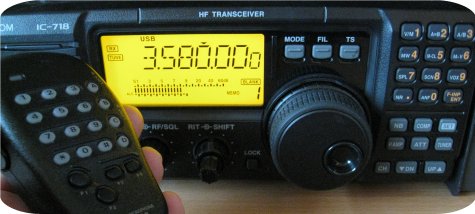Amateur radio is a worldwide community of non-profit radio enthusiasts who use radio as a hobby to communicate with other amateurs. On this page, we offer some basic information.
What is Amateur Radio?
Amateur radio is a non-profit hobby. After passing a test, you’ll be allowed to buy and operate equipment that will let you transmit to other radio amateurs in your area, and around the world.
There are several bands available, and a basic amateur radio “foundation licence” will allow you to talk to other operators. You can use the FM band to talk to local amateur radio users in your area (a little like using a CB, but with more experienced operators), and you can use the HF band to talk to other parts of the UK and around the world.

How do I become a radio amateur?
Years ago, the entrance exam was tough, with morse code being a requirement of getting an amateur radio licence. Nowadays, the exams have changed, and the Amateur Radio Foundation Licence makes it easy for anyone to get a licence and start transmitting. You can learn with the help of a local amateur radio club, or join an online amateur radio course.
For information on the Foundation licence, see the Essex Ham Guide to Foundation.
If you enjoy the hobby, you can move to the Intermediate and then the Advanced licence, which lets you do more, and at higher transmission powers.
What can I do as a radio amateur?
It’s quite a varied hobby. Here are a few things that the hobby offers:
- Use parts of the band from way down at 135KHz right up to 10GHz
- Use a fixed radio at home, an in-car radio or a portable radio to talk to other hams around the world
- Use transmitter powers of up to 400 watts (At Foundation level, you only get 10 watts)
- Learn and experiment with various aspects of radio transmission
- Play with antennas, receivers and transmitters to learn more about radio communications
- Use amateur satellites and try to make contact with the International Space Station
- Experiment with other modes, including morse code, slow scan television and packet data. You can even bounce signals off meteors and the moon.
- Build your own transmitters, power supplies and equipment (Foundation licence holders have some restrictions regarding building equipment)
More information
One of our team is a licensed radio ham, and he’s keen to add to this page – so what do you want to know?
Got a question on amateur radio? Please get in touch and help us to add to this page.
Amateur Radio FAQ
Q. Can a licensed amateur radio operator in the UK use his or her amateur radio transmitter whilst driving?
Interesting question. The law that prevents drivers from using a mobile phone does not apply to use of ‘two-way radios’. The UK law in question is the Road Vehicles (Construction and Use) (Amendment) (No.4) Regulations 2003. Regulation 110 (6)(d) exempts two-way radios, which are defined as:
“any wireless telegraphy apparatus which is designed or adapted
(i)for the purpose of transmitting and receiving spoken messages; and.
(ii)to operate on any frequency other than 880 MHz to 915 MHz, 925 MHz to 960 MHz, 1710 MHz to 1785 MHz, 1805 MHz to 1880 MHz, 1900 MHz to 1980 MHz or 2110 MHz to 2170 MHz”. (Source: legislation.gov.uk)As the frequencies listed relate to mobile phones and not amateur bands, then use of Amateur Radio equipment in-car appears to be exempt under this law. That having been said, if the police deem that use of your two-way radio is affecting your driving, they may charge you under the Road Traffic Act 1988 for “driving without due care and attention” (same applies for a driver applying make-up, lighting a cigarette or eating whilst driving)
Ham Radio iPhone Software
A couple of handy Ham Radio iPhone apps:
- Amateur Radio iPhone Apps: UK Repeaters and Ham Logger


I have my licence but it expired years ago.. my call-sign is G6VDX and I have not been active for a long time. I want to start the hobby again now that I have retired, but it seems the rules have changed since I obtained my licence. I did not take the Morse exam as I had no interest in that form of communication. Can you tell me what frequencies I can use and at what power? Also what bands are available to me?
Hi Iain,
Please have a look at the following link:
http://www.essexham.co.uk/news/returning-amateur-radio.html
This site is run by one of our team, who is an amateur, and it explains what has changed.
If you have let your licence lapse, you will need to contact Ofcom to get a valid licence. A full UK licence holder can operate up to 400 watts on most of the HF / VHF / UHF bands
With+respect….+this+is+utterly+ridicules.+..+”Build+your+own+transmitters,+power+supplies+and+equipment+(Foundation+licence+holders+have+some+restrictions+regarding+building+equipment)”
+if+i+want+to+build/make++my+own+psu+or+aeril+or+anything+else+i+will+not+be+legally+held+back,+and+im+not+even+foundation+but+have+already+built+many+in+the+past.+Im+54….+thankyou.
Looks like your messadging system is messed up as well … oh dear.
lol funny mate yes agree its a joke they want cash then tell u what u can n cant do yer rite
Ofcom+have+published+guidance+on+the+licence+conditions+,+am+I+to+understand+when+referring+to+apparatus+this+includes+all+the+equipment+that+is+in+line+to+transmit+a+signal
I am looking for the call sign of Brian Cowan . I believe he lives or lived in Bournemouth.